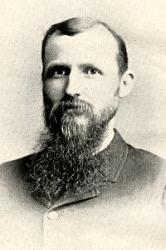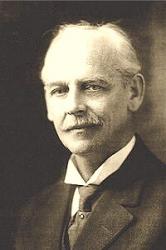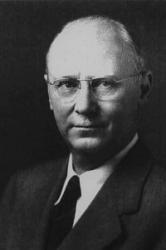Planning worship?
Check out our sister site, ZeteoSearch.org,
for 20+ additional resources related to your search.
- |
User Links
Person Results
R. M. McIntosh

1836 - 1889 Arranger of "[Beyond the smiling and the weeping]" in Crown of Beauty Used Pseudonym: Robert M. McIntosh
==========
Rigdon (Robert) McCoy McIntosh USA 1836-1899 Born at Maury County, TN, into a farming family, he attended Jackson College in Columbia, TN, graduating in 1854. He studied music under Asa Everett in Richmond, VA, and became a traveling singing school teacher. He also served briefly in the Civil War. He wrote several hymns during this period of his life. In 1860 he married Sarah McGlasson, and they had a daughter, Loulie Everett. In 1875 he was appointed head of the Vanderbilt University Music Department in Nashville, TN. In 1877 he joined the faculty of Emory College, Oxford, GA. In 1895 he left Emory College to devote his time to the R M McIntosh Publishing Company. He also served as music editor of the Methodist Episcopal Church South Publishing House for over 30 years. His song book publications include: “Good news” (1876), “Light & life” (1881), “Prayer & praise” (1883), “New life” (1879), “New life #2” (1886), and “Songs of service” (1896). He died in Atlanta, GA.
John Perry
R. M. McIntosh
Theodore E. Perkins

1831 - 1912 Person Name: T. E. Perkins Composer of "[Beyond the smiling and the weeping] (Perkins)" in Calvary Songs Theodore E. Perkins was born at Poughkeepsie, on the Hudson, N.Y., July 21, 1831. His father was a Baptist clergyman. The family of ten brothers and sisters sang and played various instruments, forming among themselves both choir and orchestra. His musical education began at the early age of three years. During his father's pastorate at Hamilton, N. Y., the choir rehearsals were often held at the parsonage, and the leader used to place the three-year-old on a small stool, on the table around which the choir was assembled, giving him a chance to both see and hear. Later on he played the violincello in church, standing on a stool in order to finger the instrument.
The home gatherings — especially on Thanksgiving Day, are the recollections among the happiest of his childhood. His father became pastor of the Berean Baptist Church in New York City, in 1839, giving him the opportunity of studying the pianoforte, of which he became a proficient player. His fine alto voice soon gave him notoriety. At the age of nineteen while filling a position as clerk in New York, all his spare time was given to the study of voice and piano. In 1851 he went to Hamilton, N. Y., taught music in Madison University (now Colgate), and in the Female Seminary.
In 1854 he went to Port Jervis, N. Y., where he taught singing school, and April 30, 1855, married Mary Frances Caskey, who was for years his soprano soloist in many musical Festivals and Conventions. Soon after marriage he removed to Salem, N. J., where his lifework as singing school teacher really began, including Bridgeton and prominent towns in southern New Jersey. During the summer of 1856 he and his wife were pupils of the Normal Academy of Music at North Reading, Mass., conducted by Drs. Lowell Mason and Geo. F. Root. During 1856-1858 he was given the position of assistant teacher and manager. His association with these two great men gave an inspiration to all his future work.
In 1859 he was co-principal with Wm. B. Bradbury at the Normal Academy of Music, Geneseo, N. Y. He remained at Geneseo until 1863. Professor Perkins also held very successful schools in North Pelham Province of Ontario, Canada, and in 1864-1868 was principal in schools at Tunkhannock and Meadville, Pa.
In 1860, The Olive Branch, his first book of church music, was published by F. J. Huntington, New York City, the sales reaching 100,000. Next was Oriental, which sold over 30,000. The Union, Glees and Anthems, and Sabbath Anthems followed ; then The Sacred Lute, which sold over 300,000. His Sunday-school books commenced with The Evergreen, followed by the Shining Star and New Shining Star. Then came Psalm King, which was the last of the books published by Mr. Huntington. Hallowed Songs was published by Philip Phillips; The Sunday School Banner was published by Wm. B. Bradbury. The Royal Standard was published in Toronto, Canada. The Golden Promise, Sabbath Carols, The Mount Zion Collection were published under his own supervision.
His Free Sunday School Songs several times numbered over 500,000 a month. Coronation Songs with Rev. Dr. Deems as hymn editor was published by A. S. Barnes Co., who also published Psalms and Hymns and Spiritual Songs, in which Dr. C. S. Robinson was hymn editor, who with Professor Perkins edited Calvary Songs, published by the American S. S. Union. Gospel Tent Songs was evangelical. The Safe-Guard Singer was his temperance book.
Mr. Perkins was musical director in the following churches in Brooklyn: The Lafayette Avenue Presbyterian Church, Rev. Dr. Cuyler; Strong Place Baptist Church, Rev. E. E. L. Taylor, D. D.; Madison Avenue Baptist Church, Rev. H. G. Weston, D. D., L. L. D.; Fifth Avenue Presbyterian Church, Rev. Dr. Rice, followed by Dr. John Hall; The Memorial Presbyterian Church, Rev. Dr. C. S. Robinson, who was his close friend; The Church of the Holy Trinity, Rev. Dr. Tyng, Jr. ; Trinity Baptist Church, Rev. Dr. J. B. Simmons, and Washington Square M. E. Church.
In Philadelphia: The Fifth Baptist Church, Rev. Dr. Chase; The Eleventh Baptist Church, Rev. Dr. Colman; The Tabernacle M. E. Church, Rev. George Gaul, D. D. He was leader and singer in Evangelistic Services, at the Rink, The Old Madison Square Garden and Cooper Union, all of New York City. The music of the first great meeting of the world's Evangelical Alliance, held for ten days in New York City, was under his direction, as was the first National Sunday School convention, held in Newark, N. J. He was also conductor at the Golden Anniversary of the Female Guardian Society, leading a chorus of forty-two hundred children. In the opening chorus, Great is the Lord, by Dr. Calcott, the word "Great" was given with so much decision and power that the clergymen on the platform sprang to their feet and remained standing until the chorus was finished.
He taught voice culture in Princeton and Lafayette Universities, The Union Theological Seminary, New York City; Crozer Seminary, Chester, Pa., and organized the music department of Temple University, Philadelphia, continuing in charge four years. He had charge of the children's choir of Howard Mission, New York City, for twenty-five years, and thinks that some of the happiest and most restful of the working hours were spent in teaching the poor children of the fourth and sixth wards to sing the Gospel. Mr. Sankey said to Mr. Perkins that " Jesus of Nazareth was my banner song for eight years." Jesus is Mine has been sung at the Christian's death-bed, the grave, and once as the convict was going to the scaffold.
His Christmas Carol Sweetly Carol had a very large sale in this country, and was republished in England, France, Italy, and Germany.
For a period of forty years he has made the study of the voice special work. The most thorough investigations of the voice and its possibilities were made with the assistance of the late John Howard, extending over a period of twenty-five years, during which he has had the care of over two thousand voices. He published a work entitled, Physiological Yoice Culture, edited by his son, the late T. Edward Perkins, M. D., physician and throat specialist of Philadelphia. Mr. Perkins also completed a method of voice culture based on the principles of John Howard's Physiology of Artistic Singing."
During these years of work he has found time to edit thirty-four books of church, Sunday-school, day-school, and glee music, the larger portion having been previously mentioned. Also songs and ballads in sheet form, and a cantata entitled, The Excursion, libretto by Fanny Crosby, with whom there has existed an unbroken friendship for over forty years.
-Biography of Gospel Song and hymn Writers
Theodore E. Perkins
D. E. Dortch

1851 - 1928 Composer of "[Beyond the smiling and the weeping]" in Grace and Glory Born: March 5, 1851, Theta, Tennessee.
Died: November 9/11, 1928, Tennessee.
Buried: Rose Hill Cemetery, Columbia, Tennessee.
Dortch was teaching music in Maury, Tennessee, in 1880, and was working as an evangelist by 1886. His works include:
Tidings of Joy (Columbia, Tennessee: 1878)
National Tidings of Joy (Nashville, Tennessee: National Baptist Convention of America, 1878)
Gospel Melodies, with William Dale & Charles Pollock (Nashville, Tennessee: Cumberland Presbyterian Publishing House, 1890)
Spirit and Life, with Edmund Lorenz (Dayton, Ohio: Christian Publishing Association, 1893)
Choice Songs (Nashville, Tennessee: National Baptist Convention of America, 1894)
Gospel Voices (Nashville, Tennessee: South-Western Publishing House, 1895)
Gospel Voices No. 3 (Columbia, Tennessee: David E. Dortch, 1902)
Hymns of Victory, Parts 1 and 2 (Columbia, Tennessee: Dortch Publishing Company, 1905)
Happy Greetings to All (Charlotte, North Carolina: Dortch Publishing Company, 1916)
© Cyber Hymnal™ (www.hymntime.com/tch)
D. E. Dortch
Alfred Beirly
Person Name: A. Beirly Composer of "[Beyond the smiling and the weeping]" in Golden Grain Dr. Alfred Beirly was the author of many song books:
Great Joy!, 1881
Crowning Glory No. 1, 1889
Sovereign Choir No. 1, A Book of Easy Anthems, 1889
Beirly’s Memorial Songs No. 1, 1892
Beirly’s Jubilee Choir Vol. 2, 1892
Beirly’s Song Triumph, 1892
Beirly’s Festal Days, 1894
Golden Grain Nos. 1 and 2 Combined, 1894
Beirly’s School Songs for Public or Private Schools, Academies and Colleges, No. 1, 1896
Beirly’s National Singer, 1898
The Concert Master, 1899
Emmanuel, a Sacred Oratorio, 1892
A Greater Chicago (The Woman’s Temple, date unknown)
The Song Wonder, 1907
A New Harbor for Chicago, 1908
NN, Hymnary editor. Source: http://www.hymntime.com/tch/bio/b/e/i/beirly_a.htm
Alfred Beirly
Charles Edward Prior
1856 - 1927 Person Name: Chas. Edw. Prior Composer of "[Beyond the smiling and the weeping]" in Songs for All Charles Edward Prior, 1856-1927
Prior played the piano at the Italian Baptist Mission in Hartford, Connecticut, in the late 19th Century.
Music--
Go Stand and Speak
Work for Us All
--hymntime.com/tch
Charles Edward Prior
Edwin Barnes

1864 - 1930 Composer of "BEYOND" in The Seventh-Day Adventist Hymn and Tune Book Edwin Barnes was born on March 15, 1864 in Shirley, Southampton, England. In 1881, Barnes moved to Battle Creek, Michigan, to attend Battle Creek College and play the organ at the Seventh-day Adventist church there. He eventually served as head of the Battle Creek College music department for almost 20 years. He also formed an amateur music club, helped found an annual spring music festival in Battle Creek, ran the Battle Creek Conservatory of Music (until 1926), and was organist and choir director at the First Congregational Church in Battle Creek. Hillsdale College, Michigan, awarded him an honorary doctorate degree in 1920. He died on April 11, 1930 in Battle Creek, Michigan.
© The Cyber Hymnal™ (www.hymntime.com/tch)
Edwin Barnes
J. Calvin Bushey
1847 - 1929 Person Name: Bushey Composer of "[Beyond the smiling and the weeping]" in Crown of Beauty James Calvin Bushey USA 1847-1929. Born in Arendtsville, PA, Bushey was a singing teacher who lived in Ohio during the latter 19th century. He compiled several music collections, including “The Chorus Class” (1879), “Sparkling Gems” (1880), “Choral Climax” (1886), and “Magneic Melodies” (1892), all published by the Music firm of Will L. Thompson. Bushey moved to Peoria,IL, late in life and died there.
John Perry
J. Calvin Bushey
Karl P. Harrington

1861 - 1953 Person Name: Karl Pomeroy Harrington Composer of "[Beyond the smiling and the weeping]" in The Cyber Hymnal Born: June 13, 1861, Somersworth, New Hampshire.
Died: November 14, 1953, Berkeley, California.
Buried: Middletown, Connecticut.
Son of Calvin S. and Eliza Chase Harrington, Karl earned his AB degree in 1882, and his AM in 1885, from Wesleyan University in Middletown, Connecticut. He studied at the University of Berlin (1887-89) and Yale University (1890-91). He taught high school in Westfield, Massachusetts (1882-85); Latin at Wesleyan Academy in Wilbraham, Massachusetts (1885-87); was a Latin tutor at Wesleyan University (1889-91); Latin professor at the University of North Carolina, Chapel Hill (1891-99); University of Maine (1899-1905); and Wesleyan University (1905). While at the University of North Carolina, he directed the Glee Club. His works include:
The Roman Elegiac Poets, circa 1914
Richard Alsop, "a Hartford Wit"
Walks and Climbs in the White Mountains, 1926
--www.hymntime.com/tch/
Karl P. Harrington
William A. Tarbutton
Person Name: W. A. Tarbutton Composer of "[Beyond the smiling and the weeping]" in Joyful Sound
William A. Tarbutton
E. L. Jorgenson

1886 - 1968 Composer of "[Beyond the smiling and the weeping]" in Great Songs of the Church Born: December 9, 1886, Nebraska.
Died: December 14, 1968, at his home in Louisville, Kentucky.
Buried: Cave Hill Cemetery, Louisville, Kentucky.
Jorgenson was the son of Danish immigrants. His father, Christopher Jorgenson, had been a soldier in the personal guard of the king of Denmark (probably Christian IX), and his mother a seamstress to the queen. The 1900 census shows the family living in Boone County, Nebraska. As a young man, Elmer led singing in churches in and around Albion, Nebraska, and in nearby Missouri. He was directing the music department at Western Bible and Literary College by 1908. In 1910, he and his wife Irene moved to Louisville, Kentucky. He was a member of the Churches of Christ.
Jorgenson’s works include:
Truth and Grace, with Robert Boll & James Shepherd (F. L. Rowe, 1917)
Great Songs of the Church (Louisville, Kentucky: Word and Work, 1921)
The New Alphabetical Hymnal (Chicago, Illinois: Great Songs Press, 1957)
© The Cyber Hymnal™ (hymntime.com/tch)
E. L. Jorgenson


 My Starred Hymns
My Starred Hymns

